What Millennials Are Doing About Climate Change
Majorities of Americans support array of measures to address climatic change but cease short of full interruption with fossil fuels
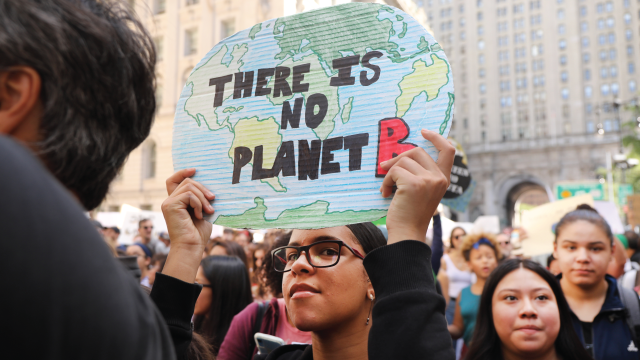
Pew Enquiry Middle conducted this study to understand how Americans view climate, free energy and environmental problems. We surveyed 13,749 U.S. adults from April 20 to 29, 2021.
The survey was conducted on Pew Inquiry Center's American Trends Panel (ATP) and included an oversample of adults ages 18 to 24 from the Ipsos Knowledge Panel. A full of 912 Generation Z adults, born after 1996, were included in the sample.
Respondents on both panels are recruited through national, random sampling of residential addresses. This way near all U.South. adults have a chance of selection. The survey is weighted to be representative of the U.S. adult population by gender, race, ethnicity, partisan affiliation, education and other categories. Read more most the ATP'south methodology.
Hither are the questions used for this report, along with responses, and its methodology.
In the get-go yr of Joe Biden's presidential term, climate, energy and environmental policy take been the subject of renewed federal attention. In recent months, the United States has rejoined the Paris Understanding on climate change, the Ecology Protection Agency has moved to sharply restrict greenhouse gas emissions, and Biden has outlined a range of policy goals, including getting the U.S. to "net-zero" by 2050.
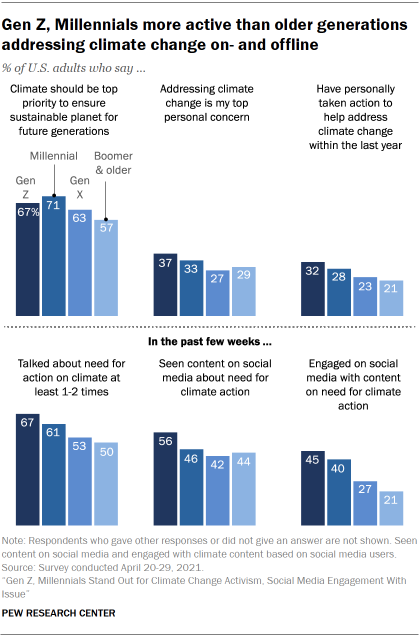
Even equally Americans place a number of pressing national problems, majorities see an assortment of actors, from government to business, equally doing besides piffling to reduce the effects of climate modify and are broadly supportive of a range of policy approaches that would assistance address climate modify, including moving toward renewable energy sources, developing infrastructure for electric vehicles, and increasing taxes and restrictions on carbon emissions.
Withal, almost Americans favor using a mix of energy sources to meet the state's needs – including renewables too as oil, coal and natural gas. There is limited support for phasing out the utilize of fossil fuels birthday. And the public is closely divided over the idea of phasing out the product of gas-powered vehicles by 2035.
Partisan gaps in views of climate change remain vast – from the salience of the issue to the office for regime addressing it. And divisions over renewable energy and stricter environmental regulations are wider today than they were under Donald Trump's administration, due to increased opposition amidst Republicans.
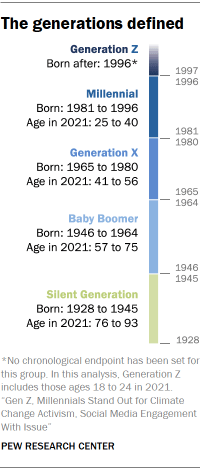
But meaningful generational differences over the demand for climate action, and engagement with the issue, stand aslope these partisan divisions. Younger activists are often at the forefront of the climate debate, with voices such as those of Greta Thunberg and the Sunrise Movement – a youth-led political organization urging increased attending to climatic change – among the nigh visible in global conversations advocating climate action.
Younger Americans – Millennials and adults in Generation Z – stand up out in a new Pew Research Center survey specially for their high levels of engagement with the upshot of climate alter. Compared with older adults, Gen Zers and Millennials are talking more than nearly the need for action on climate change; among social media users, they are seeing more climatic change content online; and they are doing more than to go involved with the consequence through activities such equally volunteering and attention rallies and protests.
While many forms of political date – such as voting – tend to be college amidst older adults, 32% of Gen Zers and 28% of Millennials have taken at least one of four actions (donating coin, contacting an elected official, volunteering or attending a rally) to help address climatic change in the terminal twelvemonth, compared with smaller shares of Gen X (23%) and Baby Boomer and older adults (21%).
The survey finds that, when asked nigh engaging with climate change content online, those in Gen Z are particularly probable to express anxiety about the hereafter. Among social media users, nearly vii-in-ten Gen Zers (69%) say they felt anxious about the future the most recent time they saw content nearly addressing climate change. A smaller bulk (59%) of Millennial social media users report feeling this way the terminal time they saw climate change content; fewer than half of Gen X (46%) and Infant Boomer and older (41%) social media users say the same.
Feet nearly the future as well is a predominant emotional reaction to climate modify content among those who are most engaged with the issue on social platforms (those who follow a climate-focused account, interact with, mail service or share climate content themselves). Majorities of these climate-engaged social media users report feeling aroused that not enough is being done when encountering climatic change content online; but big shares also say they feel motivated to learn more and confident in the ability to reduce the effects of climate change.
As a group, larger shares of younger adults place with, or lean toward, the Autonomous Political party than the GOP. Only generational differences in climate change attitudes and behaviors are non simply a reflection of the Democratic orientation of younger adults. In fact, among Republicans, generational differences in views are oftentimes quite pronounced. For example, 49% of Gen Z and 48% of Millennial Republicans (including Republican leaners) say action to reduce the effects of climatic change needs to be prioritized today, even if that means fewer resources to deal with other of import issues; significantly fewer Gen 10 (37%) and Baby Boomer and older (26%) Republicans say the aforementioned.
Attitudinal differences by generation amongst Democrats are less common, every bit large shares prioritize climate action and back policies to help reduce climate impacts. Withal, younger Democrats are more likely than older Democrats to be talking about the need for activity on climatic change and to take been personally encouraged to become more involved. And on the policy front, Gen Z and Millennial Democrats limited more openness to breaking with fossil fuels entirely than Gen X and Baby Boomer and older Democrats.
The new national survey by Pew Research Center, conducted Apr xx to 29 among 13,749 U.Southward. adults, including 912 Gen Z adults, finds a bulk of Americans (64%) say efforts to reduce the furnishings of climate change need to exist prioritized today to ensure a sustainable planet for future generations, fifty-fifty if it means fewer resources for addressing other of import issues; far fewer (34%) say climate alter should be a lower priority, given other important issues facing Americans today.
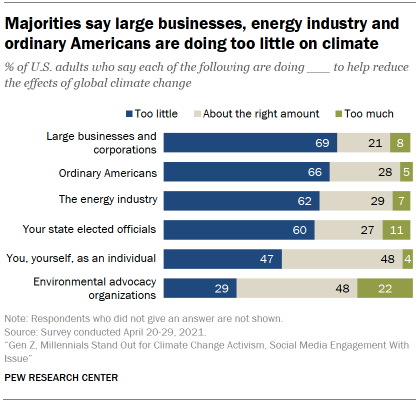
In line with the public's view that climatic change should be addressed today, majorities believe a range of public and private actors are not doing enough to help reduce climate impacts. More than six-in-ten Americans say large businesses and corporations (69%) and the energy manufacture (62%) are doing too little to address climatic change. Such critiques extend across manufacture: Ii-thirds say ordinary Americans are doing too niggling to help reduce the effects of climate change. Consistent with by Center surveys, majorities as well say the federal regime is doing too lilliputian across a range of environmental concerns – such equally protecting air and h2o quality – and 59% run into information technology equally doing too fiddling to reduce the effects of climate change.
Despite ongoing support for prioritizing alternative energy, nearly two-thirds of U.S. public opposes phasing out fossil fuels; closely divided over phasing out gas-powered cars

There are limits to how far the public is willing to go along climate and energy policy, particularly when it comes to breaking with fossil fuels, a potential shift that gained increased attention during the global drib in carbon emissions in 2020 that accompanied the COVID-19 pandemic.
Well-nigh Americans (71%) continue to say the U.Southward. should prioritize evolution of alternative energy sources, such as wind and solar, over expanding production of oil, coal and natural gas. And there is strong policy support for tougher restrictions on power plant carbon emissions, also as for college fuel-efficiency standards for cars and trucks.
Merely the public is cool to the thought of phasing out fossil fuels from the country'southward free energy supply birthday and closely divided over transitioning away from gas-powered cars.
Well-nigh ii-thirds of Americans (64%) say the U.S. should use a mix of energy sources going forward – including oil, coal and natural gas, along with renewables; far fewer (33%) support phasing out fossil fuels entirely. By 51% to 47%, a slightly larger share of Americans oppose than favor phasing out the product of new gasoline cars and trucks by 2035 – a proposal that has been put frontward by governors in 12 states, including California and New York. Phasing out gas-powered vehicles is ane of several measures the International Free energy Association says volition be needed to reach net-zero emissions globally.
The views of Gen Zers and Millennials are singled-out from those of older adults over the utilise of fossil fuels. Majorities of Gen Zers (56%) and Millennials (57%) favor phasing out new gasoline cars and trucks by the twelvemonth 2035; by contrast, majorities of Gen X (53%) and Baby Boomer and older adults (59%) oppose this idea. And while adults across generations are inclined to use a mix of sources to run across the land's energy needs, support for phasing out the apply of oil, coal and natural gas is significantly higher amidst Gen Zers and Millennials (43% and 42%, respectively) than amid Gen X (32%) and Baby Boomer and older adults (25%).
Broad back up among U.S. adults for key elements in Biden's infrastructure program; one-half say it would assist the U.S. economy
The Biden administration signaled a focus on climatic change since taking office, calling it a profound crisis. The new Center survey finds majorities of Americans back up a number of proposals to address climatic change, including three specific elements in Biden'south infrastructure programme.
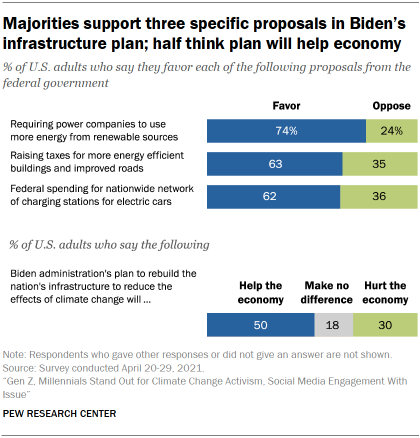
More than than seven-in-x Americans (74%) support a proposal to require power companies to increase their reliance on renewable energy sources in society to reduce carbon emissions. A smaller bulk (62%) backs federal spending to build a network of electric vehicle charging stations across the state in club to increase the use of electrical cars and trucks. And a like share (63%) supports raising corporate taxes to pay for more energy efficient buildings and improved roads, a key funding mechanism in Biden's infrastructure proposal.
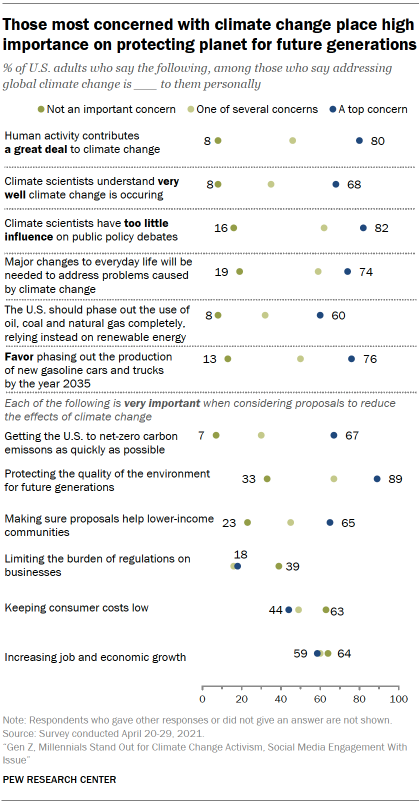
On the question of the economic benefits – or costs – of Biden's infrastructure plan, l% of U.S. adults think the plan to rebuild the country'southward infrastructure in ways that are aimed at reducing the effects of climatic change will help the economic system, while fewer (30%) think it will hurt the economy; 18% say it volition make no difference.
As expected, there are sharp partisan divisions over these proposals and their likely economic bear upon: 78% of Democrats think the Biden administration plan volition help the U.S. economy, while a majority of Republicans (59%) say the opposite and expect it to hurt the economy.
The roughly three-in-ten Americans most concerned almost climate modify differ widely from other Americans in their beliefs, priorities for climate policy
The survey provides a detailed look at the 31% of Americans for whom climate change is a top personal business concern. This group is distinct in their views on climate from the xxx% of Americans who say that climate change is non important to them personally, as well as from the 39% who call it one of several issues – but non a top upshot – they care most.
For instance, those with a strong personal business organisation about climate are much more likely than other groups to say man activity contributes "a great deal" to climate change, to believe climate scientists understand the phenomenon "very well" and to say climate scientists have also picayune influence on policy.
This group also stands out for their priorities in thinking about climate policy. Those most concerned about climatic change are especially probable to say protecting the quality of the surround for time to come generations (89%), getting the U.South. to net-zero carbon emissions as quickly as possible (67%) and making sure proposals assistance lower-income communities (65%) are very important considerations to them in climate policy proposals.
Other key findings from the survey include:
- A narrow majority in U.S. say climate scientists take too niggling influence on climate policy debates. Overall, 54% of Americans say that climate scientists have too little influence on related policy decisions, 22% say they have about the right corporeality and another 22% say they have too much influence. Democrats (77%) are far more probable than Republicans (27%) to say that climate scientists take too little influence on climate policy debates.
- Majorities of Black (68%) and Hispanic (55%) adults prioritize help for lower-income communities when considering climate policy proposals. A smaller share of White adults (38%) say helping lower-income areas is a very important consideration to them in climate proposals. Middle- and upper-income Black adults are most every bit likely equally lower-income Black adults (lxx% and 66%, respectively) to say this is very important to them. Similarly, there are no differences on this question betwixt middle/upper-income Hispanic adults and those with lower incomes (54% vs. 57%, respectively).
- Half of Americans say they have experienced farthermost weather over the past year. 3-quarters of U.S. adults support a proposal to change edifice standards so that new construction will better withstand extreme atmospheric condition; 23% say this is a bad idea because it could increase costs and cause delays in important projects. Those who say they have experienced extreme weather condition events are more likely than those who have non to consider it a good idea to modify building codes, though majorities of both limited this view.
- Republicans' views on free energy issues have shifted compared with a twelvemonth ago, leading to wider political divides between the parties. Republican back up for expanding wind and solar power, while still a majority, has decreased 13 and xi percent points, respectively, compared with a year agone when Trump was in office. The shares of Republicans and Republican leaners who support expanding hydraulic fracturing for oil and natural gas (up 10 points), offshore oil and gas drilling (upward six points) and coal mining (up 6 points) have risen over the same period. Withal, younger Republicans remain less probable than their older counterparts to support expanding fossil fuel sources, consistent with past Middle surveys.
Source: https://www.pewresearch.org/science/2021/05/26/gen-z-millennials-stand-out-for-climate-change-activism-social-media-engagement-with-issue/
Posted by: carignangatellicited99.blogspot.com

0 Response to "What Millennials Are Doing About Climate Change"
Post a Comment